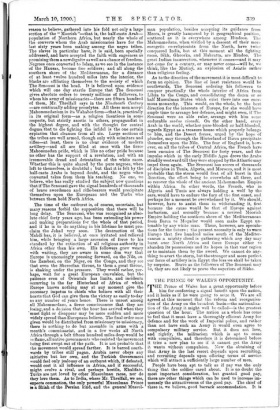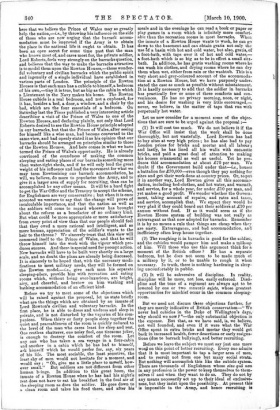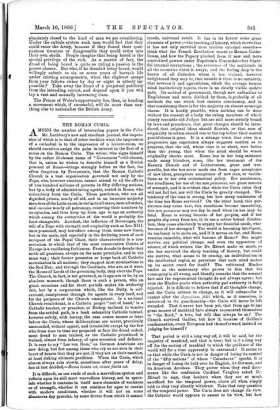THE PRINCE OF WALES'S OPPORTUNITY. T HE Prince of Wales has
a great opportunity before him for conferring a signal benefit upon the nation, and it looks as if he were going to seize it. We are all agreed at this moment that the reform and reorganisa- tion of the Army on the broadest basis—the nationalisa- tion of the Army it might well be called—is the greatest question of the hour. The nation as a whole has come to feel that it must have a, thoroughly efficient Army for defence and for the work of Imperial police, and rather than not have such an Army it would even agree to compulsory military service. But it does not love, and rightly, the militarism which is apt to come with compulsion, and therefore it is determined before it tries a new plan to see if it cannot get the Army it wants without compulsion. Now the obtaining of that Army in the last resort depends upon recruiting, and recruiting depends upon offering terms of service which will attract a sufficiently large number of men.
People have been apt to talk as if pay was the only thing that the soldier cared about. It is no doubt the most important consideration, but granted good pay, there are other things which can be used to increase im- mensely the attractiveness of the good pay. The chief of these is, we believe, good barrack accommodation. It is here that we believe the Prince of Wales may so greatly help the nation,—i.e., by throwing his influence on the side of those who are now urging that the barrack accom- modation must be improved if the Army is to obtain the place in the national life it ought to obtain. It has been an open secret for some time past that the man who knows most of, and cares most for, the ptivate soldier, Lord Roberts, feels very strongly on the barracks question, and believes that the way to make the barracks attractive is to model them upon the Rowton Houses,—those wonder- ful voluntary and civilian barracks which the public spirit and ingenuity of a single individual have established in various parts of London. The principle of the Rowton Houses is that each man has a cubicle to himself, a bedroom of his own,—tiny it is true, but as big as the cabin in which a Lieutenant in the Navy makes his home. The Rowton House cubicle is a real bedroom, and not a cupboard, for it has, besides a bed, a door, a window, and a chair by the bed, which are the four essentials of a bedroom. On Saturday last the Times published a very interesting article describing a visit of the Prince of Wales to one of the Rowton Houses, and declaring plainly, not only that Lord Roberts desired to see the Rowton House principle adopted in our barracks, but that the Prince of Wales, after seeing for himself like a wise man, had become converted to the same view, and bad openly stated it as his opinion that our barracks should be arranged on principles similar to those of the Rowton Houses. And here comes in what we have termed the Prince of Wales's opportunity. He is already convinced of the soundness of making the common sleeping and eating places of our barracks something more than water-tight sheds, and if he will only lend the great weight of his influence and lead the movement for what we may term Rowtonising our barrack accommodation, he will, we believe, do more to popularise the Army, and to give it a larger area of supply for recruiting, than can be accomplished by any other means. It will be a hard fight to get the War Office and the Treasury to accept the scheme, for Englishmen are very conservative ; but when it is once accepted we venture to say that the change will prove of incalculable importance, and that the nation as well as the soldiers will come to regard whoever has brought about the reform as a benefactor of no ordinary kind. But what could be more appropriate or more satisfactory from every point of view than that our people should feel that they owed a more rational and intelligent, and so more human, appreciation of the soldier's wants to the heir to the throne ? We sincerely trust that this view will commend itself to the Prince of Wales, and that he will throw himself into the work with the vigour which pro- duces success. And there is special need for prompt action. New barracks will have to be built very shortly on a large scale, and no doubt the plans are already being discussed. It is sincerely to be hoped that, with the necessary modi- fications to meet military needs, they will be formed on the Rowton model.—i.e., give each man his separate sleeping-place, provide him with recreation and eating rooms which, without being over-luxurious, are bright, airy, and cheerful, and bestow on him washing and bathing accommodation of an efficient kind.
Before we try to meet some of the objections which will be raised against the proposal, let us state briefly what are the things which are obtained by an inmate of Lord Rowton's civilian and voluntary barracks. In the first place, be is able to dress and undress and sleep in private, and is not disturbed by the vagaries of his com- panions. When thirty or forty people sleep together the quiet and peaceableness of the room is quickly reduced to the level of the man who cares least for sleep and rest. One restless chatterer, one noisy fool, one tiresome joker, is enough to destroy the comfort of the room. Let any one who has taken a sea voyage in a four-cabin and another in a cabin which he has had to himself, ask himself which he would prefer for, say, six years of his life. The most sociable, the least secretive, the least shy of men would not hesitate for a moment, and would say : "Oh, give me a little place to myself, how. ever small." But soldiers are not different from other human beings. In addition to this great boon, the inmate of a Rowton House when he has had his night's rest does not have to eat his breakfast in the foul air of the sleeping room as does the soldier. He goes down to a clean room and takes his food there, and after his meals and in the evenings he can read a book or paper or play games in a room which is infinitely more comfort. able than the recreation rooms in most barracks. When the inmate of a Rowton House wants to wash, he can go down to the basement and can obtain gratis not only the use Of a basin with hot and cold water, but also, gratis, of a foot-bath, with taps over it of hot and cold water,— a foot-bath which is so big as to be in effect a small sitz- bath. In addition, he has gratis washing rooms where he can wash his clothes, and drying rooms where he can dry them when wet, either from rain or the washtub. This is a very short and grey-coloured account of the accommoda- tion at a Rowton House, but we have purposely under- stated the case as much as possible without misstatement. It is hardly necessary to add that the soldier in barracks has practically few or none of these comforts and con- veniences. He has no privacy morning, noon, or night, and his desire for washing is very little encouraged,— never, we believe, in the matter of taps that run with perpetually hot water.
Let us now consider for a moment some of the objec. tions that are sure to be urged against the proposal :— (1) It will cost too much. We do not believe it if the War Office will insist that the work shall be done thoroughly, but not wastefully. Lord Rowton has had to buy sites at very high prices ; he has also had to pay London prices for bricks and mortar and all labour ; and lastly, he has lined all his walls with encaustic bricks, and paid a great deal of attention to making his houses ornamental as well as useful. Yet he pro. duces thid accommodation at about £70 per man. We doubt if the Government build under that—i.e., houses a battalion for £70,000—even though they pay nothing for sites and get their work done at country prices. Or, to put it in another way, Lord Rowton gives all this accommo- dation, including bed-clothes, and hot water, and warmth, and service, for a whole year, for under £10 per man, and yet makes a good profit. We wonder whether the Govern. ment, taking account of repairs, and rates and taxes, and service, accomplish that. We expect they would be very glad if they could board out their soldiers at £10 per annum without food. If so it would seem as if the Rowton House system of building was not really as extravagant as that now adopted for barracks. Remember it is by no means a rule that things are cheap when they are nasty. Extravagance, and bad accommodation, and inefficiency often keep house together.
(2) The roughing it in barracks is good for the soldier, and the cubicles would pamper him and make a milksop of him. Will those who use this argument think for a moment of the British officer ? He has a separate bedroom, but he does not seem to be made much of a milksop by it, or to be unable to rough it when necessary. In truth, there is nothing hardening in sleep- ing uncomfortably in public.
(3) It will be subversive of discipline. In reality, discipline will be more, not less, easily enforced. Disci- pline and the tone of a regiment are always apt to be lowered by one or two mauvais skids, whose greatest opportunities for mischief occur in the common sleeping. room.
But we need not discuss these objections further, for they are merely indicative of British conservatism—" We never had cubicles in the Duke of Wellington's days, why should we now ? "—the only substantial objection is the expense. But that, as we have said, is, we believe, not well founded, and even if it were what the War Office spent in extra bricks and mortar they would get back in increased health, fewer desertions or early resigna- tions (due to barrack bullying), and better recruiting.
Before we leave the subject we must say just one more word on this point of better recruiting. Every one admits that it is most important to tap a larger area of men, and to recruit not from one but many social strata. But nothing will accomplish this like the cubicle system. There are thousands of Eoglishmen whose sine qua non in any profession is the power to keep themselves to them- selves if and when they want to do so. They do not by any means necessarily act up to their ideal of exclusive. ness, but they insist upon the possibility. . At present this is impossible in the Army, and hence recruiting is absolutely closed to the kind of man we are considering. Under the cubicle system such men would feel that they could enter the Army, because if they found their com- panions tiresome or disagreeable they could retire into their own shells. People imagine that being bored is the special privilege of the rich. As a matter of fact, the dread of being bored is quite as ruling a passion in the poorer classes. But who, if he dreaded being bored, would willingly submit to six or seven years of barrack life under existing arrangements, when the slightest escape from your fellows either by day or night is utterly im- possible? Take away the dread of a perpetual publicity from the intending recruit, and depend upon it you will tap a vast and annually increasing class.
The Prince of Wales's opportunity lies, then, in heading a movement which, if successful, will do more than any- thing else to nationalise the British Army.








































 Previous page
Previous page